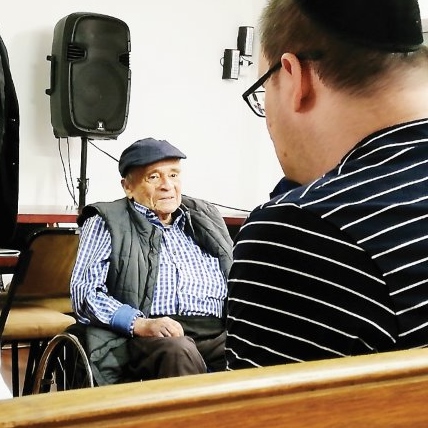
Featured Item

Mordechai Perlov’s story: from despair to the big screen
JORDAN MOSHE
For the first time, however, the 93-year-old’s harrowing ordeal is coming to the big screen, the focus of a unique documentary which tells not only his story, but that of so many others brutally oppressed by Soviet Russia.
Directed and produced by Johnathan Andrews, Because of Stalin is the culmination of two years of tireless research, interviews, and an unstinting determination to expose the evils of Stalin’s tyranny.
The recently completed documentary was screened last week at Chabad of Melrose, attended by a select, small audience invited at Perlov’s discretion. The stalwart survivor was also present, as was Andrews.
“This is Mordechai’s story,” said Andrews. “It’s very long. To cover it all would take more than six hours, so we condensed it into an hour and half.
“This film gives historical context to Mordechai’s story. It’s been quite a journey, and I really hope that people enjoy watching it and take something from it.”
Andrews said that the film’s release was initially slated for 4 November last year. However, the Lithuanian embassy in Pretoria and the Lithuanian ministry of foreign affairs became involved in the project. “They took us to Lithuania to meet members of parliament who are historians and who actually appear in the documentary,” said Andrews. “When they saw the preview of the film, they asked to collaborate with us. We chose to pull it from cinemas and postpone it to allow them to get involved.”
Born in 1926 in the shtetl of Rasein in Lithuania, Perlov and his family were part of a community of about 5 000 Jewish residents who made up about 40% of the town’s population. His family owned a timber and flour mill and lacked nothing. All this would change when Stalin occupied Lithuania in 1939. With about 20 000 other so-called “enemies of the state”, they would be deported and sent to remote locations, facing harsh labour and unspeakably dire living conditions. In spite of losing his parents, Perlov would survive the ordeal against all odds, escaping Soviet territory and making his way to Israel and later South Africa where he resides today.
In addition to Perlov’s account, the documentary features analysis from numerous historians who contextualise his story and elaborate on the true extent of Soviet tyranny. The documentary suggests that there are many untold stories which emerged from World War II, and that while certain Jews suffered under Nazi rule because they were Jewish, others who fell under Soviet control had as bad a fate simply because they were deemed to be the enemies of communism.
“The Holocaust is basically the main narrative,” said Violeta Davoliūtė, a professor at Vilnius University who contributed towards the documentary. “It is largely true for the Polish Jews, who suffered deportation to camps. It is more complex for many Lithuanian Jews because many of them perished in the brutal conditions of Stalin’s regime.”
Indeed, what emerges is that the reality of life under Soviet rule, while not based on policies of racial purity or anti-Semitism per se, was clearly as barbaric as Nazi Germany.
“The difference is that Hitler declared what he was going to do,” said Irena Veisaitė, a scholar and Holocaust survivor who also appears in the film. “He was in some ways ‘sincere’. Stalin was a real Tartuffe. He always pretended not to be what he was. Life was cruel and dramatic, and we were caught between two terrible powers.
“The Soviets were a big danger to the world, and Stalin pretended to be a humanist. The truth is that people feared him.”
Both Nazism and Stalinism used mass murder as an acceptable method of achieving their agendas. However, whereas Nazi oppression ended with the cessation of the war, Stalin continued to oppress and massacre Soviet enemies well into the forties and even the fifties. Until today, few Russian historians recognise the extent of Soviet oppression, paying little attention to Russia’s occupation of Lithuania and what was effectively an act of genocide against countless people.
This is a primary message conveyed by the documentary, and is a point which Perlov stresses above all.
“Whether it’s the tsar, Stalin, or Putin, they are all murderers, and many people in the world don’t know about it,” said Perlov. “I kept quiet for many years. Now, I need to bring a message to humanity.” He maintains that the Soviets surpassed the Nazis’ cruelty in numerous ways, and remains committed to exposing the true extent of Stalin’s atrocities.
“I hope this movie will become available to as many people as possible,” an emotional Perlov concluded. “We need everyone’s help to achieve this.”
He thanked Andrews and all those involved in the project. “It wasn’t an easy ride over the past two years. There were a few arguments, some disagreements, but we’re still friends.”
The premier has been rescheduled for 18 March in Pretoria and 19 March in Cape Town. Following the film’s release, Ster-Kinekor will make it available to the public for one week beginning on 27 March.




